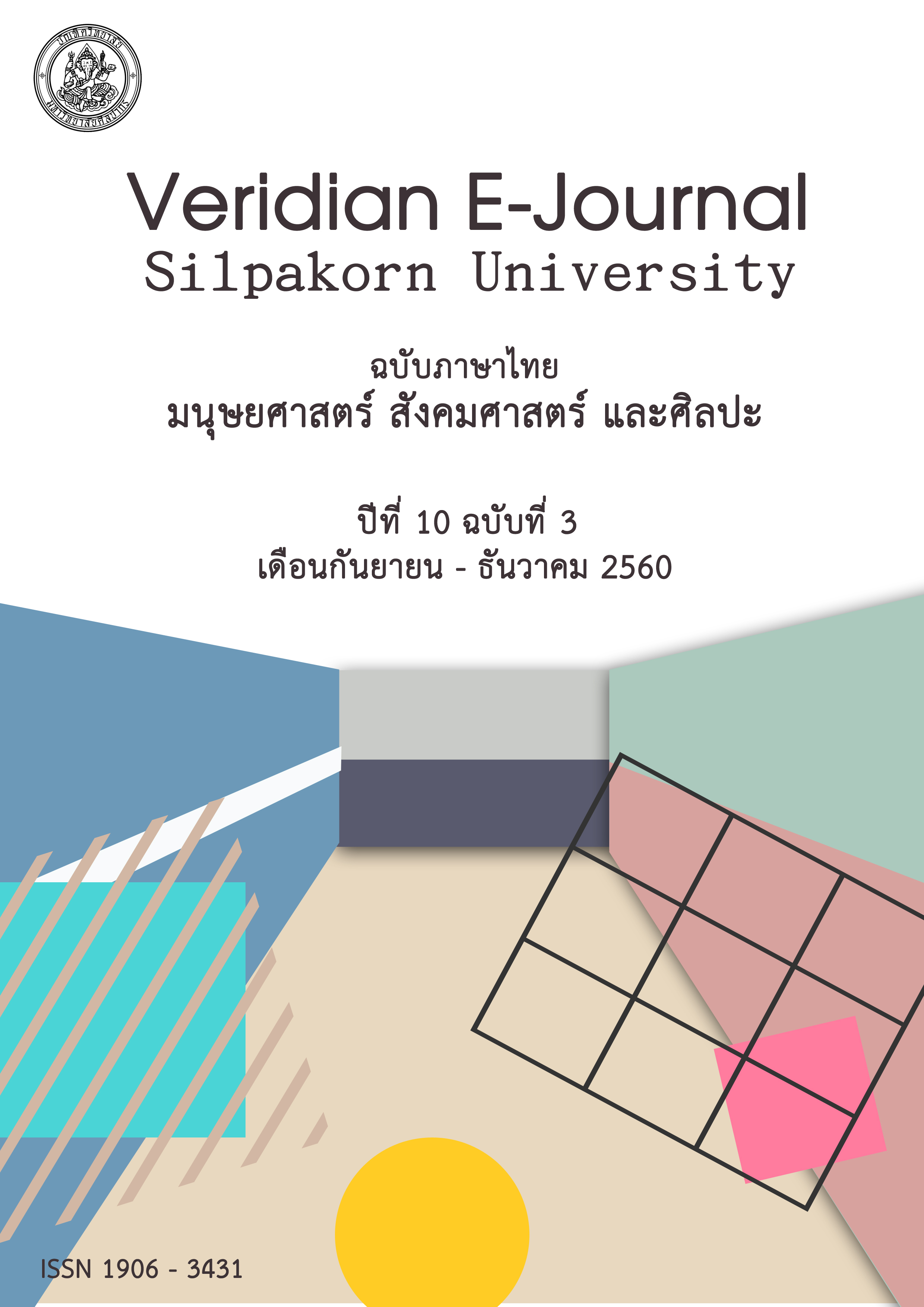การพัฒนารูปแบบการจัดการเรียนรู้ท้องถิ่นศึกษา เพื่อส่งเสริมพฤติกรรมการอนุรักษ์ภูมิปัญญาท้องถิ่น สำหรับนิสิตปริญญาตรี
Main Article Content
Abstract
การวิจัยครั้งนี้มีวัตถุประสงค์ดังนี้ 1) เพื่อพัฒนารูปแบบการจัดการเรียนรู้ท้องถิ่นศึกษา เพื่อส่งเสริมพฤติกรรมการอนุรักษ์ภูมิปัญญาท้องถิ่น สำหรับนิสิตปริญญาตรี 2) เพื่อศึกษาประสิทธิผลการใช้รูปแบบการจัดการเรียนรู้ท้องถิ่นศึกษา เพื่อส่งเสริมพฤติกรรมการอนุรักษ์ภูมิปัญญาท้องถิ่น สำหรับนิสิตปริญญาตรี และ 3) เพื่อขยายผลการใช้รูปแบบการจัดการเรียนรู้ท้องถิ่นศึกษา เพื่อส่งเสริมพฤติกรรมการอนุรักษ์ภูมิปัญญาท้องถิ่น สำหรับนิสิตปริญญาตรี กลุ่มตัวอย่างในการวิจัยครั้งนี้ เป็นนิสิตระดับปริญญาตรี หลักสูตรการศึกษาบัณฑิต สาขาสังคมศึกษา ชั้นปีที่ 3 คณะศึกษาศาสตร์ มหาวิทยาลัยทักษิณ วิทยาเขตสงขลา ภาคเรียนที่ 2 ปีการศึกษา 2559 จำนวน 48 คน ที่ลงทะเบียนเรียนในวิชาท้องถิ่นศึกษา ได้มาจากการเลือกแบบเจาะจง (Purposive Sampling) เครื่องมือที่ใช้ในการวิจัย ประกอบด้วย แผนการจัดการเรียนรู แบบทดสอบวัดความรู้ความเข้าใจในรายวิชาท้องถิ่นศึกษา แบบประเมินพฤติกรรมการอนุรักษ์ภูมิปัญญาท้องถิ่น สำหรับนิสิตปริญญาตรี การวิเคราะห์ข้อมูล โดยใช้ค่าเฉลี่ย () ส่วนเบี่ยงเบนมาตรฐาน (S.D.) ค่าทีแบบไมอิสระ (t-test dependent) และการวิเคราะห์เนื้อหา (content analysis)
ผลการวิจัย พบว่า
- รูปแบบการจัดการเรียนรู้ท้องถิ่นศึกษา เพื่อส่งเสริมพฤติกรรมการอนุรักษ์ภูมิปัญญาท้องถิ่น สำหรับนิสิตปริญญาตรี มีองค์ประกอบคือ 1) หลักการของรูปแบบการจัดการเรียนรู้ 2) วัตถุประสงค์ของรูปแบบการจัดการเรียนรู้ 3) กระบวนการจัดการเรียนรู้ 4) เงื่อนไขการนำรูปแบบการจัดการเรียนรู้ไปใช้ ประกอบด้วย หลักการและการตอบสนอง ระบบสังคม สิ่งสนับสนุน โดยรูปแบบการจัดการเรียนรู้ที่พัฒนาขึ้นมีกระบวนการจัดการเรียนรู้ 5 ขั้นตอน คือ 1. ขั้นตระหนักสำนึกท้องถิ่นตนเอง 2. ขั้นรวบรวมวัฒนธรรมท้องถิ่น 3. ขั้นวางแผนอนุรักษ์สืบค้นภูมิปัญญาท้องถิ่น 4. ขั้นทำตามแผนที่กำหนด 5. ขั้นประเมินผลและประยุกต์ใช้
2. ประสิทธิผลของรูปแบบ พบว่า 2.1) หลังเรียนตามรูปแบบนิสิตมีความรู้ความเข้าใจในวิชาท้องถิ่นศึกษาสูงกว่าก่อนเรียนอย่างมีนัยสำคัญทางสถิติที่ระดับ .05 2.2) นิสิตมีผลประเมินพฤติกรรมการอนุรักษ์ภูมิปัญญาท้องถิ่นสูงขึ้นจากระดับการรับรู้คุณค่า 2.3) นิสิตมีความพึงพอใจต่อรูปแบบการจัดการเรียนรู้ท้องถิ่นศึกษา เพื่อส่งเสริมพฤติกรรมการอนุรักษ์ภูมิปัญญาท้องถิ่น สำหรับนิสิตปริญญาตรีอยู่ในระดับมากที่สุด
This research aimed to: 1) development of learning process local studies model to enhance conservative behavior of local wisdom for undergraduate students; 2) determine the effectiveness of using the development of learning process local studies to enhance conservation behavior of local wisdom for undergraduate Students and 3) apply the development of learning process local studies model to enhance conservative behavior of local wisdom for undergraduate students. The sample used in this research, drawn according to the purposive sampling, included 48 third year undergraduate students majoring in social studies, Faculty of Education, Thaksin University, Songkhla Campus during the second semester of the 2016 academic year, who have enrolled in Local Wisdom Education course. The research instruments included lesson, achievement tests in the Local Wisdom Education course, and a form for assessing students’ conservative behavior of local wisdom. The data were analyzed using such statistics as arithmetic mean (x̅), standard deviation (S.D.), the t-test dependent and content analysis.
The findings of the research revealed the following:
- The development of learning process local studies model to enhance conservative behavior of local wisdom for undergraduate students consisted of three elements: 1) principles of the learning management model; 2) objectives of the learning management model; 3) learning management process; and 4) conditions for implementing the learning management model, which consisted of principles and responses, social system, and supportive elements. Developed learning management model involved five stages of learning management: 1. Raise Awareness of Local, 2. Gather Culture Local, 3. Plan for Conserving and Searching Thai Local Wisdom, 4. Follow the Set Plan, and 5. Evaluate and Apply.
2. For the effectiveness of the model, it was found that: 2.1) After learning with the model, students showed a higher level of knowledge and understanding of Local Wisdom Education than before learning with model at the .05 level of significance. 2.2) Students evaluation result a high conservative behavior of local wisdom up from the level of perceived value to the level of perceived value. 2.3) Students’ satisfaction toward the model was at higher level most.

